In this series of posts, University of Pennsylvania students who took the spring 2019 APOC (Appropriate Point of Care Diagnostics) course write about their experience traveling to Ghana in May-June 2019.
by Allaire Morgan (Electrical Engineering, ’22)
Today, the team took various field trips related to water supply and public health. After being picked up on the bus, we drove for about an hour through the busy (and bumpy) streets of Kumasi to the Barakese Headworks of Ghana Water Company Limited. We spent the majority of the morning and early afternoon on a tour of the plant, following in chronological order the retrieval and treatment of water from the reservoir.
Upon walking up to the dam, the roar of the water was powerful. We went into a garage-like building which housed the four large pumps from the dam, pumping water uphill for further processing. After climbing approximately five stories on a shaky ladder, we reached the top of the dam to observe the reservoir from which the Ghana Water Company extracts its water. From there, our team ventured up the hill to observe the water treatment plant.
With the sun beating down, we slowly made our way through the facility, observing each stage of the treatment process in which millions of gallons of water were being treated at a time. The first stage, aeration, takes about six hours to complete. From there, water is pumped into giant drums for sedimentation, where water is stirred and polymers are added to force harmful chemicals to settle at the bottom. Clean water then slowly rises up in the million-gallon drum, with the clean water spilling over the edges to be collected and further processed in large sand filters. The sludge at the bottom of the drum is currently pumped back into the river, which may propose a serious public health problem in the future. The team then followed our guide into the labs, where we observed the various tests which are performed daily on the water after treatment to ensure proper sanitation. Lab technicians perform chemical experiments and culture the water to ensure that water-borne diseases cannot be carried by the filtered water.
After learning so much at the treatment plant, the team jumped on the bus to escape the heat and then traveled, after lunch, to the Komfo Akoye Teaching Hospital to observe the patient intake process in the hypertension clinic. We watched carefully in small groups from the corner of each doctor’s office to see how patients are treated and diagnosed. The doctors see around twenty to thirty patients per day, but on worse days they can see up to forty, with around two being new referrals from peripheral clinics. After speaking with the patient, the doctor makes a prescription recommendation on the patient’s paper file and gives it to the nurse for further processing. Each patient has a paper book which contains all of their medical data and history since coming to the hospital, and they retrieve it from a records room every time they visit. When asked about digitizing the process, the nurses were surprisingly resistant, arguing that they already were used to the paper filing system and they do not have the proper training to efficiently use a computer to file records.
After a long day of observations, the team traveled back to the guest house to eat dinner. Over our meal of pizza , spring rolls, and ambiguous but delicious juice, we discussed the events of the day and refocused our project, ironing out a specific plan for how we want to design our program and creating a vision for its implementation. We went to bed exhausted from a long day’s work but motivated for the project developments to come.

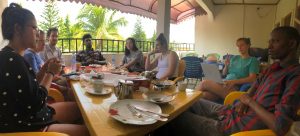
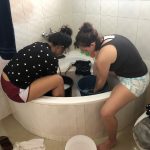
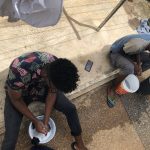
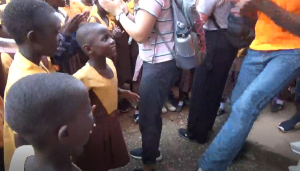 On this beautiful Tuesday, we woke up at our hotel to a lovely breakfast of sausage and pepper omelets. After our meal we loaded up on the bus to drive over to Aprade. On the way to Aprade we picked up our water and sanitation expert of friends: Sophia, Kingsley, and Alfred. We first stopped at Aprade Government School where we met with the entire population of the school to present a demonstration on hand-washing. After the presentation we took a tour of the school to survey their existing water and sanitation systems. We learned about their construction projects and about the school itself, which educates about six hundred students!
On this beautiful Tuesday, we woke up at our hotel to a lovely breakfast of sausage and pepper omelets. After our meal we loaded up on the bus to drive over to Aprade. On the way to Aprade we picked up our water and sanitation expert of friends: Sophia, Kingsley, and Alfred. We first stopped at Aprade Government School where we met with the entire population of the school to present a demonstration on hand-washing. After the presentation we took a tour of the school to survey their existing water and sanitation systems. We learned about their construction projects and about the school itself, which educates about six hundred students!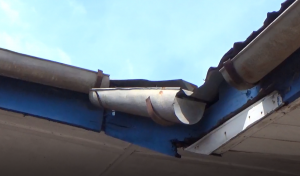 Our second stop was to the main village of Aprade. We were taken through the village and observed their rainwater collection systems and boreholes. We discovered the public and private boreholes around the village. Everyone was so hospitable and welcoming. Before continuing we took a quick break to eat lunch on the bus. The food was catered and we had a delicious meal of jollof rice and fried chicken. There was refreshing mango and ginger juice to cool us down from the hot day.
Our second stop was to the main village of Aprade. We were taken through the village and observed their rainwater collection systems and boreholes. We discovered the public and private boreholes around the village. Everyone was so hospitable and welcoming. Before continuing we took a quick break to eat lunch on the bus. The food was catered and we had a delicious meal of jollof rice and fried chicken. There was refreshing mango and ginger juice to cool us down from the hot day.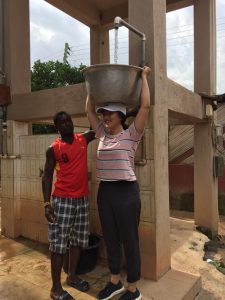 After lunch we drove over to Mmeswam. We were able to make an appointment with the Chief! He brought us into his home with welcoming arms; it was amazing being able to shake the chief’s hand. The chief showed us around Mmeswam and led us to his boreholes and wells. The main borehole pumps water to a large elevated tank. Underneath that tank is a pipe and valve mechanism where villagers come to collect water in large basins. The chief encouraged us to take the basin on our heads and try to carry some of the water. Ellie, Kyler and El were chosen among the group to test their strength.
After lunch we drove over to Mmeswam. We were able to make an appointment with the Chief! He brought us into his home with welcoming arms; it was amazing being able to shake the chief’s hand. The chief showed us around Mmeswam and led us to his boreholes and wells. The main borehole pumps water to a large elevated tank. Underneath that tank is a pipe and valve mechanism where villagers come to collect water in large basins. The chief encouraged us to take the basin on our heads and try to carry some of the water. Ellie, Kyler and El were chosen among the group to test their strength.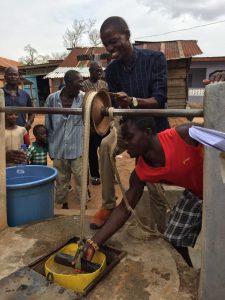 From the boreholes we walked over to the village’s wells. The oldest well was spoiled and is unusable. The working well in the village was a traditional pulley system well. Several of our students cast the bucket and fished up some water. After our day of water we thanked the chief and hopped back on the bus. We drove back to campus, dropped off the graduate students at campus, and made a stop at the mall. We grabbed dinner at Game and quickly made our way home. It had been a long day so we chowed down on dinner and passed out for the night. A great and very busy day!
From the boreholes we walked over to the village’s wells. The oldest well was spoiled and is unusable. The working well in the village was a traditional pulley system well. Several of our students cast the bucket and fished up some water. After our day of water we thanked the chief and hopped back on the bus. We drove back to campus, dropped off the graduate students at campus, and made a stop at the mall. We grabbed dinner at Game and quickly made our way home. It had been a long day so we chowed down on dinner and passed out for the night. A great and very busy day!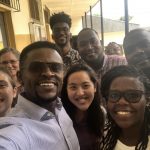 As we toured the university by bus, I talked to Kingsley some more about water systems currently in place, to which he explained the role of politics in the amount of technology able to be implemented. “Trust me, we have the technology,” he exclaimed. “It’s just the will of the people, and the government, that prevent us from using it.” The government here is peculiar compared to that of the United States: Where we had always been focused on separation of state and church, religion and culture here serve as the two strongest influences on the government and their decision-making, which can serve both as a blessing and a curse in some cases like that of water supply funding.
As we toured the university by bus, I talked to Kingsley some more about water systems currently in place, to which he explained the role of politics in the amount of technology able to be implemented. “Trust me, we have the technology,” he exclaimed. “It’s just the will of the people, and the government, that prevent us from using it.” The government here is peculiar compared to that of the United States: Where we had always been focused on separation of state and church, religion and culture here serve as the two strongest influences on the government and their decision-making, which can serve both as a blessing and a curse in some cases like that of water supply funding.